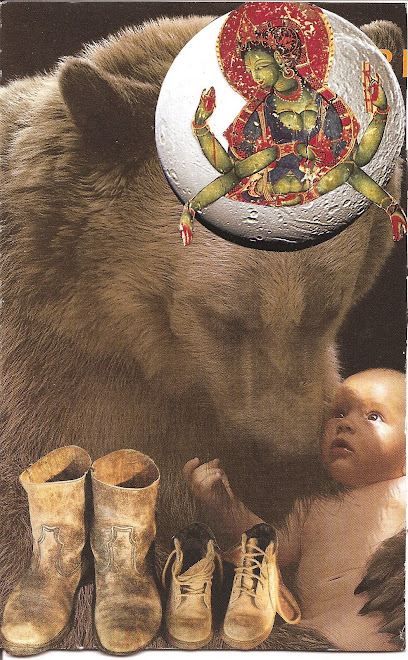
"Deeper meaning resides in the fairy tales told me in my childhood than in any truth that is taught in life."~Johann Christoph Friederich v. Schiller ~ German Poet (1759-1805)
When you're old enough to return to fairy tales, you remember their deeper meaning, perhaps crave that meaning that resonates in your heart and soul. You certainly need the truths they tell and you read them because you have to, because there's no other choice, because not reading them and in my case not writing them, is not an option.
I've finally started the seminal book on the Wild Woman archetype, Women Who Run With The Wolves cy Clarissa Pinkola Estes, Ph.D. I should have read it before. I've had the book for years. Yet it was only after my heart attack and bypass, when the Wild Woman revealed herself to me again, that I picked up the book and started it at last.
I approach books like conversation. For me the act of reading is dialogic, a collaborative effort of give and take. I don't take what I read as gospel. I have always been a questioner; I still am. So as I read about the specific archetypal interpretations of particular fairy tales I got to thinking: Do fairy tales mean just one thing or are they like dreams, speaking to each reader individually? And if only the dreamer can interpret his or dream, does that mean only the reader interpret a story for himself or herself?
Take Bluebeard for instance. In the Aarne-Thompson system of classifying folktale plots, Bluebeard is type 312, about women whose brothers rescue them from their ruthless husbands or abductors. I have read that it was particularly useful as a warning about the dangers of marrying out of a tribe/community and of course, the warning against curiosity, particularly women's curiosity, goes back to the Bible. Clarissa Pinkola Estes in Women Who Run With the Wolves, devotes a section of her book on the Bluebeard fairy tale. She writes that Bluebeard is an innate contra naturam aspect of the psyche, a part that opposes the positive, development, harmony and the wild. And O get that; I see how it could be that, and maybe 90% of the time, is that. But is that all it is? Do fairy tales reflect one archetypal process only? Is that all there is? If so, it's time to send in the clowns. When I first read Bluebeard as a young girl, I thrilled a bit with fear at that dark man. When I read the story again nearing fifty I found myself identifying more with Bluebeard, the ugly strange who wanted to marry a beautiful girl, who gave her wealth, who trusted her with the keys of his kingdom with only one caveat, not to go into one room, which of course, she did. Does it matter that the room was full of the head's of his other untrustworthy wives? And I couldn't quite get Rilke's advice to a young poet: "Love consists in this, that two solitudes protect and touch and greet each other” and "Once the realization is accepted that even between the closest human beings infinite distances continue, a wonderful living side by side can grow, if they succeed in loving the distance between them which makes it possible for each to see the other whole against the sky.” For someone with Romantic proclivities, this seems both wonderful and impossible. Could I have left that room alone if I had loved Bluebeard? Could I have let him have that solitude, that space without me, that I could never travel, and been content? Pre-bypass, no. I would have trespassed. Post-bypass, yes. I would have left the room alone and had my happily ever after. Of course this assumes love between Bluebeard and his bride, which I'm not sure the fairy tale does. Since I cannot conceive of marriage without it, that is my assumption when I read it and so to leave alone what we are asked to, how could you not for one you love. Of course, I was asked to do this and did it, only to find my love gone. There is such great risk in that wild land of the other we can never travel. Yet me must love that too, mustn't we? I'm still reading, musing, pondering, wondering, playing, and writing fairy tales. up to happily ever after and all that time after. I'm definitely old enough, that's for sure. I'll keep you posted.





No comments:
Post a Comment